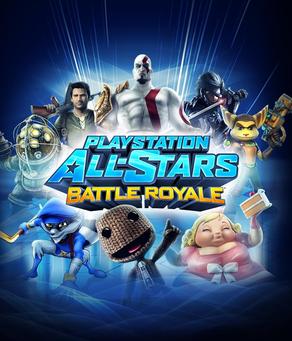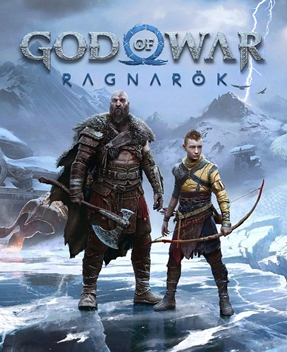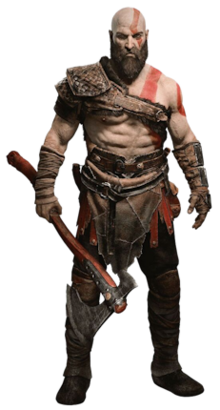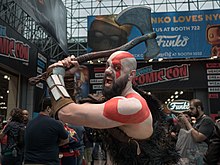In Norse mythology, Móði and Magni are the sons of Thor. Their names translate to "Wrath" and "Mighty," respectively. Rudolf Simek states that, along with Thor's daughter Þrúðr ("Strength"), they embody their father's features.

God of War is a 2005 action-adventure game developed by Santa Monica Studio and published by Sony Computer Entertainment (SCE). First released for the PlayStation 2 on March 22, 2005, the game is the first installment in the God of War series and the third chronologically. Loosely based on Greek mythology, it is set in ancient Greece with vengeance as its central motif. The player controls the protagonist Kratos, a Spartan warrior who serves the Olympian gods. The goddess Athena tasks Kratos with killing Ares, the God of War and Kratos' former mentor who tricked Kratos into killing his wife and daughter. As Ares besieges Athens out of hatred for Athena, Kratos embarks on a quest to find the one object capable of stopping the god once and for all: Pandora's Box.

The Olympians are a fictional species appearing in American comic books published by Marvel Comics. These characters are based on the Twelve Olympians/Dii Consentes and other deities of Classical mythology. During the beginning of the 1960s, the exploits of the Asgardians Thor and his evil brother Loki demonstrated that an updating of ancient myths could again win readers. In 1965, Stan Lee and Jack Kirby introduced the Olympians in Journey into Mystery Annual #1.

God of War II is a 2007 action-adventure game developed by Santa Monica Studio and published by Sony Computer Entertainment (SCE). First released for the PlayStation 2 on March 13, 2007, the game is the second installment in the God of War series, the sixth chronologically, and the sequel to 2005's God of War. It is based on Greek mythology and set in ancient Greece, with vengeance as its central motif. The player character is protagonist Kratos, the new God of War who killed the former, Ares. Kratos is betrayed by Zeus, the King of the Olympian gods, who strips him of his godhood and kills him. Slowly dragged to the Underworld, he is saved by the Titan Gaia, who instructs him to find the Sisters of Fate, as they can allow him to travel back in time, avert his betrayal, and take revenge on Zeus.

God of War: Chains of Olympus is a 2008 action-adventure hack and slash video game developed by Ready at Dawn and published by Sony Computer Entertainment for the PlayStation Portable. It is the fourth installment in the God of War series, the second chronologically, and a prequel to the original God of War. It is loosely based on Greek mythology and set in ancient Greece, with vengeance as its central motif. The player controls Kratos, a Spartan warrior who serves the Olympian gods. Kratos is guided by the goddess Athena, who instructs him to find the Sun God Helios, as the Dream God Morpheus has caused many of the gods to slumber in Helios' absence. With the power of the Sun and the aid of the Titan Atlas, Morpheus and the Queen of the Underworld Persephone intend to destroy the Pillar of the World and in turn Olympus.

God of War III is a 2010 action-adventure game developed by Santa Monica Studio and published by Sony Computer Entertainment. First released for the PlayStation 3 on March 16, 2010, it is the fifth installment in the God of War series, the seventh chronologically, and the sequel to 2007's God of War II. Loosely based on Greek mythology, the game is set in ancient Greece with vengeance as its central motif. The player controls the protagonist Kratos, the former God of War, after his betrayal at the hands of Zeus, King of the Olympian gods, whom he learned was his father. Reigniting the Great War, Kratos ascends Mount Olympus until he is abandoned by the Titan Gaia. Guided by Athena's spirit, Kratos battles monsters, gods, and Titans in a search for Pandora, without whom he cannot open Pandora's Box, defeat Zeus, and end the reign of the Olympian gods to have his revenge.

God of War: Betrayal is an action-adventure mobile game developed by Javaground and Sony Online Entertainment's (SOE) Los Angeles division, and published by Sony Pictures Digital. Released for mobile phones supporting the Java Platform, Micro Edition on June 20, 2007, it is the third installment in the God of War series, and the fifth chronologically. Loosely based on Greek mythology, Betrayal is set in ancient Greece with vengeance as its central motif. The player controls the protagonist Kratos, who became the new God of War after killing the former, Ares. Kratos is framed for the murder of Argos and pursues the true assassin across Greece, resulting in a confrontation with Olympian messenger Ceryx.

Cory Barlog is an American video game designer, director, and writer who is the current creative director of video game development at Santa Monica Studio. He is best known for his work on the God of War series.
God of War is an action-adventure game franchise created by David Jaffe and developed by Sony's Santa Monica Studio. It began in 2005 on the PlayStation 2 (PS2) video game console and has become a flagship series for PlayStation, consisting of nine installments across multiple platforms. Based on ancient mythologies, the series' plot follows Kratos, a Spartan warrior who becomes the God of War and comes into conflict with various mythological pantheons. The earlier games in the series are based on Greek mythology and see Kratos follow a path of vengeance against the Olympian gods; the later games are based on Norse mythology and see Kratos on a path of redemption while also introducing his son Atreus as a secondary protagonist.
Ares has appeared frequently in modern popular culture; he usually appears as the ancient Greek god of war in the most generally familiar classical mythology.

The characters of the God of War video game franchise belong to a fictional universe based on Greek mythology and Norse mythology. As such, the series features a range of traditional figures, including those from Greek mythology, such as the Olympian Gods, Titans, and Greek heroes, and those from Norse mythology, including the Æsir and Vanir gods and other beings. A number of original characters have also been created to supplement storylines.

God of War is a six-issue American comic book limited series set in the Greek mythology era of the God of War universe. The series was written by Marv Wolfman, illustrated by Andrea Sorrentino, and the cover art for each issue was produced by Andy Park, who was also an artist for the video game series. The first five issues of God of War were published by WildStorm. Due to the company's closure in December 2010, the final issue was published by their parent company, DC Comics. The series' launch coincided with the release of the video game God of War III in March 2010. The final issue was published in January 2011, followed by a trade paperback in March.

God of War: Ghost of Sparta is a 2010 action-adventure hack and slash video game developed by Ready at Dawn and published by Sony Computer Entertainment for the PlayStation Portable. It is the sixth installment in the God of War series, the fourth chronologically and the second to not be developed primarily by Santa Monica Studio. Loosely based on Greek mythology, Ghost of Sparta is set in ancient Greece with vengeance as its central motif. The player controls the protagonist Kratos, the God of War. Kratos is still haunted by the visions of his mortal past and decides to explore his origins. In Atlantis, he finds his mother Callisto, who claims that his brother Deimos is still alive. Kratos journeys to the Domain of Death to rescue his brother. After initial resentment from Deimos, the brothers team up to battle the God of Death, Thanatos, Deimos' captor.

God of War: Ascension is a 2013 action-adventure game developed by Santa Monica Studio and published by Sony Computer Entertainment for the PlayStation 3. Released in March 2013, it is the seventh installment in the God of War series and a prequel to the entire series. Loosely based on Greek mythology, it is set in ancient Greece with vengeance as its central motif. The player controls the protagonist, Kratos, the former servant of the God of War Ares, who tricked Kratos into killing his wife and daughter. In response to this tragedy, Kratos renounced Ares, breaking his blood oath to the god. Kratos was, therefore, imprisoned and tortured by the three Furies, guardians of honor and enforcers of punishment. Helped by the oath keeper, Orkos, Kratos escapes his imprisonment and confronts the Furies, aiming to free himself of his bond to Ares.

PlayStation All-Stars Battle Royale is a 2012 crossover fighting game developed by SuperBot Entertainment and published by Sony Computer Entertainment. It features various characters drawn from different PlayStation video game franchises competing against each other in multiplayer battles. The game was released in November 2012 for the PlayStation 3 and PlayStation Vita video game consoles.
God of War is an action-adventure video game series, the first era of which was loosely based on Greek mythology. Debuting in 2005, the series became a flagship title for the PlayStation brand and the character Kratos is one of its most popular characters. The series consists of nine games across multiple platforms; the first seven make up the Greek era of the series. Five of the Greek era games have been re-released through three separate compilations for the PlayStation 3 (PS3) platform: God of War Collection (2009), God of War: Origins Collection (2011), and God of War Saga (2012). With the exception of God of War III in the God of War Saga, each collection features remastered ports of the games that were not originally released on the PS3. God of War III was later remastered as God of War III Remastered and released on PlayStation 4 (PS4) in July 2015. God of War: Betrayal, God of War: Ascension, God of War (2018), and God of War Ragnarök are the only installments that have not been remastered for a newer platform or included in a collection.

God of War is a 2018 action-adventure game developed by Santa Monica Studio and published by Sony Interactive Entertainment. The game was released for the PlayStation 4 in April 2018, with a Windows port released in January 2022. It is the eighth installment in the God of War series, the eighth chronologically, and the sequel to 2010's God of War III.

Sunny Suljic is an American actor. He is known for his roles as Bob in Yorgos Lanthimos's 2017 drama The Killing of a Sacred Deer and as the voice and motion capture actor for Atreus, the son of Kratos, in the 2018 video game God of War, for which he was nominated for the BAFTA Award for Best Performance in a Video Game and the D.I.C.E. Award for Outstanding Achievement in Character. He reprised the role in the game's 2022 sequel, God of War Ragnarök, for which he was nominated for Best Performance at The Game Awards 2022, the BAFTA Award for Performer in a Leading Role, and the D.I.C.E. Award for Outstanding Achievement in Character. In 2018, Suljic had his first lead role in Jonah Hill's film Mid90s, for which he received a Critics' Choice Movie Award for Best Young Performer nomination.

Warriors Orochi 4, released as Musou Orochi 3 in Japan, is a 2018 hack and slash video game developed by Koei Tecmo and Omega Force for Microsoft Windows, PlayStation 4, Xbox One and Nintendo Switch. It is the fifth installment of the crossover series Warriors Orochi, a combination of the Dynasty Warriors and Samurai Warriors series. The game was released in Japan on September 27, 2018, and in North America and Europe in October.

God of War Ragnarök is a 2022 action-adventure game developed by Santa Monica Studio and published by Sony Interactive Entertainment. It was released worldwide on November 9, 2022, for both the PlayStation 4 and PlayStation 5, marking the first cross-gen release in the God of War series, and was released for Windows on September 19, 2024. It is the ninth installment in the series, the ninth chronologically, and the sequel to 2018's God of War. Loosely based on Norse mythology, the game is set in ancient Scandinavia and features series protagonist, Kratos, and his now teenage son, Atreus. Concluding the Norse era of the series, the story follows Kratos and Atreus' efforts to prevent the nine realms from being destroyed by Ragnarök, the eschatological event which is central to Norse mythology and was foretold to happen in the previous game after Kratos killed the Aesir god Baldur.






















